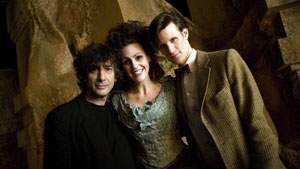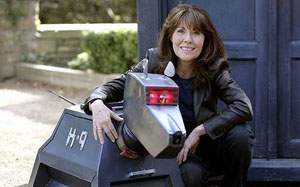
However, what I am enjoying most is the return to more multi-part episodes (rather than trying to cram everything into a single episode) and the greater use of an ensemble cast. In the really bad old days of budget cuts and bizarre screening times, it seemed that all we had was Sylvester McCoy (as the Doctor) and Bonnie Langford (as his companion) running around a quarry in Wales. This is in contrast to the early days, even through to the Peter Davidson 5th Doctor era, when the Tardis was frequently home to three companions at any one time.
In the current series, the teaming up of characters Amy Pond (Karen Gillan) and her husband Rory Williams (Arthur Darvill) as regular companions on the Tardis echoes the relationship between Ben (Michael Craze) and Polly (Anneke Wills) in 1966-67, adding a boy-girl romantic relationship dimension - and all the interpersonal dynamics that involves - but without entangling the Doctor and making him look like some kind of time-travelling Lothario. Of course, as the Doctors during Anneke Wills’ time (she played the role Swinging Sixties posh totty – although according to a reference in a 2010 Sarah Jane Adventure, she and Ben are still together and now running an orphanage in India) were William Hartnell and Patrick Troughton, any Doctor-companion romance would have been decidedly icky to watch.
And of course by freeing the Doctor from any romantic entanglements with his female companion, the scriptwriters can bring other relationships into the mix. In The Doctor’s Wife it was Suranne Jones as the Tardis, while in the first two episodes (The Impossible Astronaut and Day of the Moon) it was the phenomenal Alex Kingston as River Song. Kingston returns in episode 7 and when the series resumes in the autumn (seven episodes now, ending in a cliffhanger, then six more episodes).
Interestingly, from the debate I have seen online, the most contentious aspect of the current series seems to be the complexity and multi-layering of the plots. It is no longer simply the Doctor and his companions landing on planet, having an adventure and then flying off into the sunset. Instead, within the current series we have the ‘shall we warn the Doctor that an older version of himself knows he is going to die’ dilemma plus the Amy and Rory century-spanning Last Centurion/Pandorica/Amy 's pregnancy story line and the River Song ‘time-traveller from the future living her timeline out in the opposite direction to the Doctor’s saga. But what’s wrong with that?
Modern TV audiences are far more sophisticated and demanding than they were 30 years ago. Just look at the complex and interwoven story lines and plotting we saw in the recent Battlestar Galactica series. In fact, some of the story lines in the earlier series of Doctor Who, particularly during the Tom Baker era, were distinctly obtuse. Then again, way back in 1966, there was a four-parter, featuring William Hartnell and Peter Purves (as Steven Taylor), set during the St Bartholomew’s Eve Massacre in Paris, an incident so obscure it has now pretty much fallen off every school and university history syllabus.
Overall verdict: if you thought the last series was a little bit meh, don’t worry; the combination of head writer/executive producer Steven Moffat and Matt Smith have returned Doctor Who from being a zero back into a hero.
PS: did anyone else notice that the wrecked spaceship seen in the distance on the planet that was the setting for The Doctor’s Wife looked a lot like the derelict alien spaceship in the opening scenes of the original Alien movie? Nice shared cultural reference guys.
Postscript: Elisabeth Sladen (1948-2011)

Of all the Doctor Who companions (with the possible exception of Rose/Billie Piper) Sarah Jane Smith was one of the few where there seemed to be a plausible (and well-acted) sexual chemistry with The Doctor. For callow youths like myself, another attraction of Sarah Jane (a journalist for the purposes of the story-line) was she was also admirably plucky and prepared to take on an alien or a monster rather than stand in a corner, screaming and waiting to be rescued.
For those of us Baby-Boomers who grew up with Doctor Who, Elisabeth Sladen was also the only companion who grew old with us – although in her case her looks and on-screen vivacity belied her biological age.
Fittingly, the latest series of Doctor Who (which aired four days after her death from cancer) carried a dedication to her. She will be missed both as an actress – she is one of the defining characters in the series’ long-running history – and as a person. Even when she switched on the lights at my nearby town of Beccles a few years ago, the organisers said she was the nicest celeb they had ever dealt with.
Charles Christian.